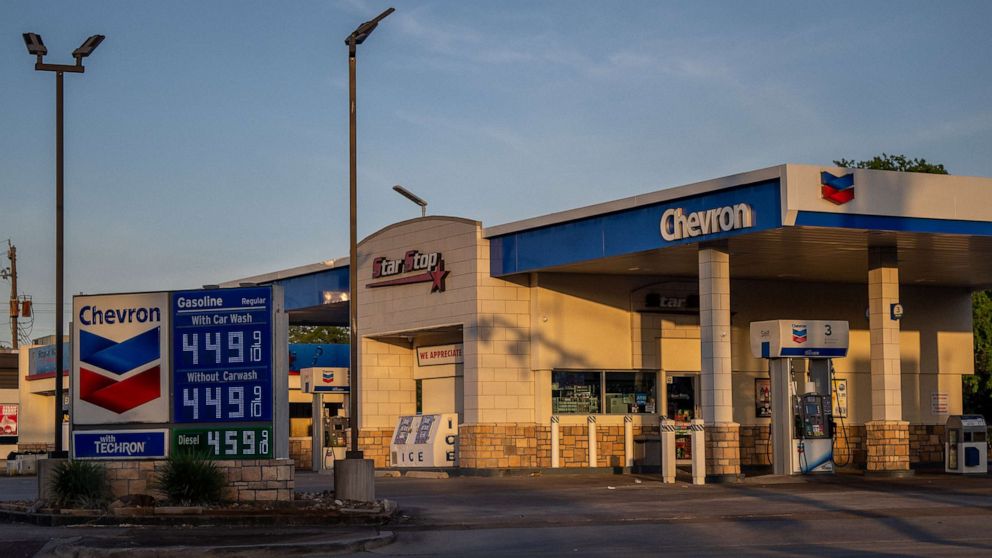Biden says falling gas prices show his 'program is working'
He said the cost at the pump has dropped for 25 consecutive days.

President Joe Biden on Friday touted falling gas prices, robust new jobs numbers and a low unemployment rate to make the case that his economic program and fight to bring inflation down is "working."
"The unemployment rate is near a historic low of 3.6%. The private sector jobs are at a record high," he said at a White House event about abortion. "Gas prices are still way too high, and have fallen 25 days in a row. And this week we saw the second largest single day decrease in gas prices in a decade. We still have a lot of work to do ... But I am suggesting we are making significant progress. The program is working."
The national average for a gallon of gas stood at $4.72 Friday, down three cents from Thursday and about 12 cents since this time last week, according to AAA.
The average cost for gas peaked at $5.01 per gallon on June 14, according to AAA, and the price of crude oil fell below $100 per barrel this week for the first time since May 11.
Relief at the pump comes as global demand for commodities slows, resulting in lower prices for crude oil copper, cotton, and lumber.
"I think the reason why oil prices are going down now is because the prospect that we do see an economic slowdown," GasBuddy's head of petroleum analysis Patrick De Haan told ABC News Thursday.
If that trend continues, a potential recession could prove politically problematic for Biden and fellow Democrats ahead of the midterm elections in November. Building a strong economy was a priority in the Democratic party's 2020 platform.
"But, if all of a sudden, the worries over the recession fade, we can see oil prices go right back up," De Haan said.
A hurricane making landfall near a refinery, such as one in Louisiana, could also cause prices to rise.
In the coming weeks, what Americans pay at the pump in some states could fall another 25 to 50 cents per gallon on average, De Haan said.
Some stations around the country have already lowered prices to the mid-three-dollar range.
The president's remarks Friday are the latest in a largely unsuccessful White House effort to counter damaging daily headlines about skyrocketing prices at the pump.
What began with attributing the rise in prices to Russia's invasion of Ukraine became a proposal to suspend the federal gas tax for three months. But that plan found little support among Republicans and Democrats in Congress. Some Republican senators called the proposal to halt the 18-cent tax a gimmick, while some Democrats said it might not work.
The president also floated offering rebate cards to Americans in June, but the Washington Post reported a chip shortage would make it challenging to produce the cards.
Secretary of Energy Jennifer Granholm then met with top oil executives late last month to discuss how their companies might help ease pain at the pump, but some analysts say it is unlikely the current price drop is related to the administration's lobbying efforts.
The falling price of crude oil and weakened demand have driven the cost of gas down and the industry is also working through higher-cost inventory, according to investment research firm Third Bridge's global lead for energy Peter McNally.
"That is bringing prices at the pump down, not the president telling the corner gas station to do it," McNally said Thursday.
The White House doubled down this week, again calling for Congress to suspend the federal gas tax Thursday and blaming Russia's invasion of Ukraine Friday.
"Wholesale gas prices are down by $1 per gallon," White House press secretary Karine Jean-Pierre told reporters Thursday. "Retail gas prices have only come down by about 20 cents over the same period. More work needs to be done."
But gas stations are slowly lowering their prices as they try to recapture some of their margins from when prices rose, De Haan said. Stations are behind the curve when their costs rise for up to five days, as raising prices is difficult if other stations do not adjust theirs, he said.
The White House and the Federal Reserve deserve some credit for recognizing inflation as a serious challenge, University of Houston petroleum engineering professor Ramanan Krishnamoorti said Thursday.
The FED raising interest rates last month "certainly slowed down some of the price exuberance we've seen with inflation," he said.
The government's release of 100 million oil barrels from the Strategic Petroleum Reserve year-to-date has also helped. Releasing oil has added supply to the market, likely preventing prices from going higher, McNally said.



